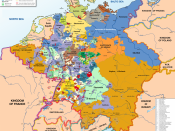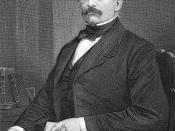History Essay
The Unification of Germany
Patrick Love
In the 19th century, a new idea had a profound effect on the borders of Europe. Both Germany and Italy were affected by Nationalism, and the idea for many independent states to band together, and create a more prosperous and powerful kingdom. In the case of Germany, it was a series of events that Otto Von Bismark effectively facilitated that led to Germany more so as we know it today. One point that is important to realize, while discussing unification, it can be achieved by both having liberated peoples (romantic nationalism), or a single leader playing his cards right for his advantage. Though Bismarck did utilize both these techniques, it is fair to say that he himself was a romantic nationalist (Britannica encyclopedia article), and this was what won him and the people a single nation.
The First step of Bismarck's long trek to unification started in the early 1860s, when he conspired with Austria to invade the Duchies to the north.
He did it in a very sneaky way, however, where he was able to have Austria convinced that the invasion didn't have a role in their country's unification. At the treaty of Gastein, after a successful invasion of the duchies, it was decided that the northern Danish territories were to be split between Germany and Austria. This, however, Bismarck did not accept; because he knew if Austria would use those territories against them when they started showing signs of unifying. This brought Bismarck to his second invasion that decade, when later that year he reinvaded Holstein that was at the time owned by Austria. Though this made Austria a dead enemy of Prussia, he was able to stabilize his control and perceived leadership in the country, which was important for...


